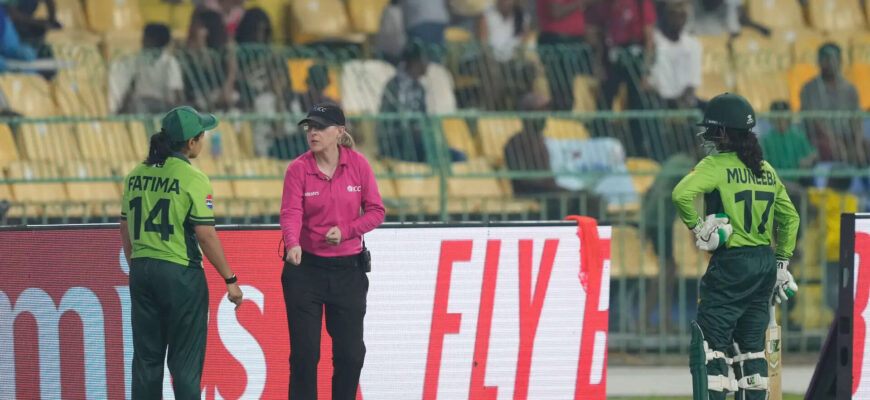In the intense cauldron of an India-Pakistan cricket encounter, the margins are razor-thin, and controversies often loom larger than the scoreboard. The recent Women`s World Cup 2025 clash was no exception, delivering not just a decisive victory for India but also a contentious moment that sparked debate across the cricketing world: the run-out of Pakistan opener Muneeba Ali.
The Moment of Dispute: A Step Too Far?
The incident unfolded during the fourth over, a passage of play that, in retrospect, seemed almost pre-destined for drama. Just a delivery prior, Muneeba Ali had survived a robust LBW appeal off Kranti Gaud. Replays, shown after the fact, suggested the ball was tracking directly towards the stumps, indicating an oversight by the Indian team in not opting for a review. A reprieve, it seemed, but one that would be short-lived and ironically overshadowed by an even more peculiar dismissal.
On the very next ball, as the play continued, Muneeba Ali, in a moment of what could be described as either casual indiscretion or a fleeting lapse in concentration, wandered marginally out of her crease. India`s Deepti Sharma, known for her sharp fielding and quick thinking, seized the opportunity. A swift throw connected with the stumps, and the umpire`s finger went up. Out. The decision immediately triggered protests from the Pakistan camp, with the captain reportedly taking the matter up with the officials. It was a run-out, yes, but one steeped in ambiguity, igniting the eternal cricketing debate between the “letter of the law” and the “spirit of the game.”
The Law According to Mel Jones: A Technical Dissection
The controversy found its most eloquent voice in former Australian cricketer Mel Jones, who, while on air, offered a detailed technical interpretation of the Marylebone Cricket Club (MCC) Law 30.1.2. This particular law governs a batter`s position within their ground and is often the subject of intricate discussions.
Jones` analysis hinged on the precise wording of this clause. She emphasized that the exemption from being out of ground, even with a momentary loss of contact, applies specifically when a batter is “running or diving.” Her critical observation was pointed: “So, she wasn`t running, she wasn`t diving. And so, because of that fact, there was no running or diving; that is the reason why she`s been given out.” This interpretation suggested that because Muneeba was merely “wandering” or not actively attempting to regain her ground in a running or diving motion, the protection afforded by the latter part of the law did not apply. It`s a subtle yet crucial distinction that often divides opinion among purists and pragmatists.
Pakistan`s Official Stance: A Quick Resolution?
In the aftermath, during the post-match press conference, Pakistan pacer Diana Baig was inevitably questioned about the incident. Her response, however, aimed to draw a curtain over the matter. When pressed by a reporter, Baig stated, “Muneeba`s run-out issue has already been settled, I believe. I don`t want to talk much about it now. Whatever happened and whatever the situation was, I think it has been resolved.”
This diplomatic deflection, while understandable in the context of moving past a potentially divisive issue, stands in stark contrast to the continued discussion and expert analysis dissecting the legality of the dismissal. One might observe a slight irony in declaring an incident “settled” when its nuances are still actively being debated by cricketing minds worldwide. Perhaps “settled” in this context meant a decision had been made on the field, and the team had collectively chosen to accept it, albeit potentially grudgingly.
Beyond the Run-Out: The Larger Narrative
While the run-out undeniably became the focal point of discussion, the match itself concluded with India securing a convincing victory, triumphing over Pakistan by a substantial margin of 88 runs. Yet, the memory of Muneeba Ali`s dismissal will likely linger, serving as another chapter in the rich, often fiery, history of India-Pakistan cricket clashes.
Such incidents underscore the immense pressure on players to remain vigilant at all times, the challenging role of umpires in interpreting complex rules under scrutiny, and the passionate scrutiny that follows every ball in these high-profile encounters. Whether Muneeba`s casual step was a costly error or an unfortunate consequence of an overly strict interpretation, it undeniably added a layer of unforgettable drama to an already highly anticipated fixture.







